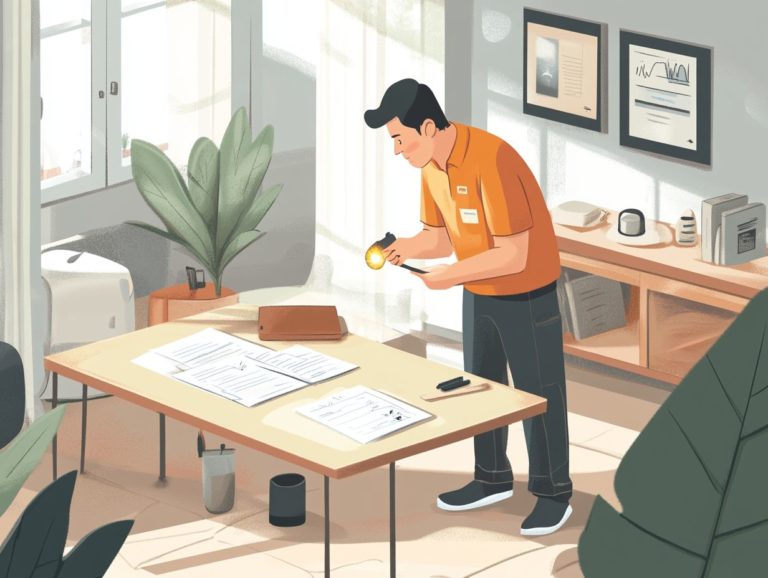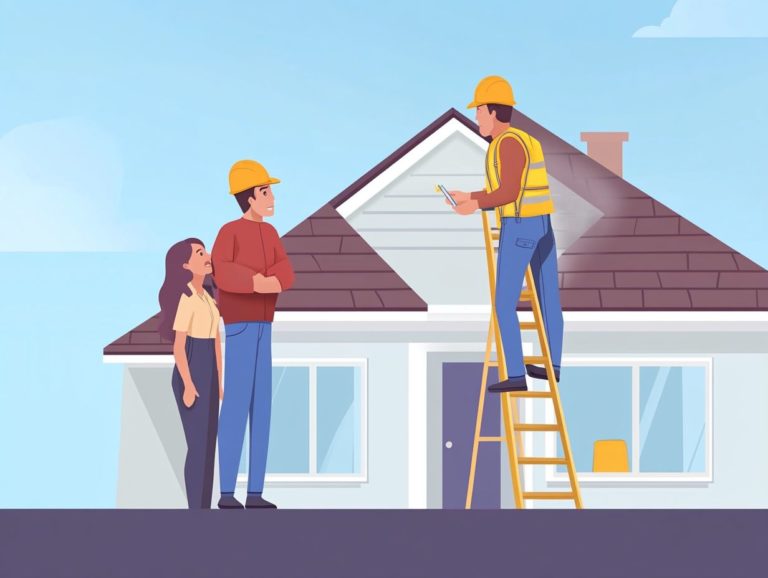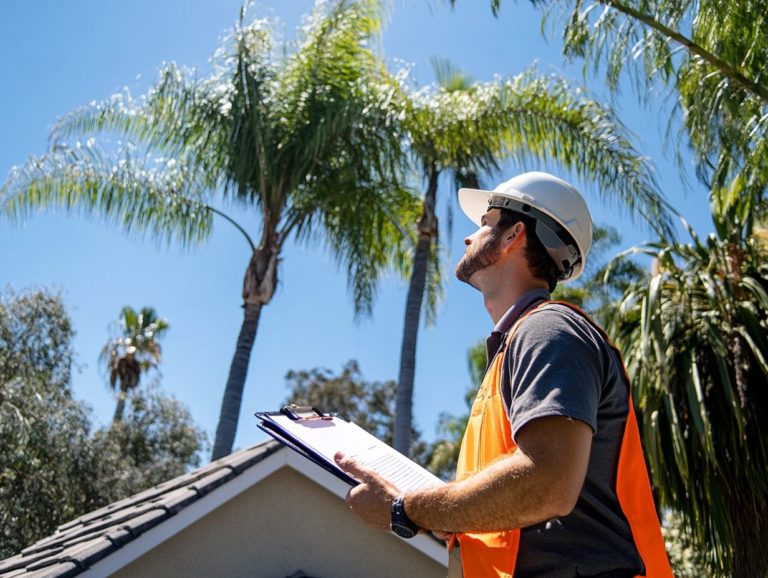The Importance of Home Inspections in Real Estate Transactions
Buying or selling a home can feel like a monumental task, and truly knowing the details of buying or selling a home hinges on your grasp of home inspections.
These assessments are vital; they empower buyers to make informed decisions while enabling sellers to showcase their properties at their finest.
Let s explore what home inspections are all about, their importance for both buyers and sellers, the specific areas they assess, and tips for selecting a qualified inspector.
Whether you’re stepping into the market as a buyer or seller, having a solid understanding of home inspections is crucial for ensuring a seamless transaction.
Contents
Key Takeaways:

Home inspections are crucial in real estate transactions for both buyers and sellers. For buyers, home inspections provide valuable insights and negotiating power. For sellers, these inspections help you fix issues before listing and build trust with potential buyers.
Understanding Home Inspections
Understanding home inspections is a critical step in your real estate journey, offering a comprehensive overview of a property’s condition. This essential process enables both buyers and sellers to make informed financial decisions, highlighting the role of home inspections in real estate transactions and fostering transparency in property evaluations and future planning.
In Maryland, Pennsylvania, Washington DC, and Virginia, the expertise of a certified inspector becomes even more crucial in identifying potential issues such as structural integrity, plumbing concerns, and electrical systems that could impact the market value of your property.
Home inspections don t just focus on what s visible; they delve into critical systems like heating, ventilation, and air conditioning systems (HVAC) and foundational issues, providing everyone involved with peace of mind throughout the negotiation process.
What is a Home Inspection?
A home inspection is an in-depth evaluation of your property’s condition, highlighting essential aspects such as structural integrity, plumbing systems, electrical wiring, HVAC systems, and other critical components.
During this thorough assessment, qualified inspectors meticulously examine both the interior and exterior features of your residence, ensuring that no potential issues slip through the cracks. Their expertise allows them to spot defects or safety hazards that could jeopardize your home’s livability.
The final inspection report becomes an invaluable document for both buyers and sellers, offering a comprehensive analysis of the property’s condition, complete with photographs, recommended repairs, and estimated costs. This report can inform your future decisions about the property.
Understanding this process is crucial for homeowners to avoid costly mistakes!
Why Home Inspections Matter
Home inspections are essential in real estate transactions, acting as a vital negotiation tool for both buyers and sellers. They ensure that you fully grasp the property’s condition before sealing the deal, highlighting the importance of home inspections in real estate and fostering transparency and knowledge-based decision-making for all parties involved.
Why They Are Important for Buyers
For you as a home buyer, the significance of home inspections cannot be overstated. They play a crucial role in identifying potential issues that may require repairs and serve as a foundation for negotiating either repairs or adjustments to the property price, as highlighted in the role of home inspections in real estate.
By conducting a meticulous inspection, you can uncover hidden problems that might elude notice during the initial viewing, effectively reducing future risks that could lead to substantial costs. This process grants you valuable insights into the property’s overall condition, allowing you to make well-informed decisions.
Typically, an inspection contingency is included in the purchase agreement, giving you the leverage to address any issues that arise or even withdraw from the deal without penalty if serious problems are discovered. This safety net highlights the importance of home inspections, helping to pinpoint necessary repairs and supporting you throughout your home-buying journey.
Ready to schedule a home inspection or consult with a professional? Don’t wait take the first step to secure your investment!
Why They Are Important for Sellers

For home sellers, conducting a pre-listing home inspection is a savvy strategy. It enables you to facilitate seller disclosure, tackle issues before your property hits the market, and foster trust with potential buyers.
By identifying and addressing potential problems early on, you enhance your property’s market value and create a more enticing offering for buyers.
This proactive approach helps you avoid unexpected surprises during negotiations. It reduces the chances of price reductions or drawn-out contingencies.
Transparency in disclosing your property’s condition bolsters buyer confidence. This allows them to move forward with clarity and assurance.
Taking the time to address issues beforehand can significantly speed up the selling process, leading to quicker closing times and a smoother transition for everyone involved.
In the end, a well-kept and inspected home shines bright in the competitive market!
What Home Inspections Cover
Home inspections encompass a comprehensive array of areas and systems, from checking the structure and roof conditions to plumbing, electrical systems, and HVAC systems.
This thorough assessment guarantees you gain a complete understanding of the property’s condition, leaving no stone unturned.
Areas and Systems Inspected
- Structural integrity
- Roof conditions
- Plumbing
- Electrical wiring
- HVAC systems
Each of these elements is essential for evaluating the overall health of the property. They are critical for creating a safe living environment and help you sidestep potentially expensive repairs in the future.
For instance, checking the structure can uncover any foundational issues that might threaten your home’s stability. Evaluating the roof can pinpoint leaks that could lead to water damage and mold growth definitely not on anyone s wish list.
Assessing the plumbing is crucial to prevent leaks and water damage, ensuring sanitation remains uncompromised.
Inspecting the electrical wiring is a must to avert fire hazards. Examining the HVAC systems is vital for keeping your home comfortable and the air quality pristine.
Each of these evaluations plays a significant role in maintaining your property, enabling you to take proactive measures that preserve your investment while creating a safe haven for your family.
Benefits of Home Inspections for Buyers
The advantages of home inspections for buyers go far beyond simple property assessments. They offer a valuable opportunity to uncover potential issues, highlighting the importance of a home inspection for buyers, enabling you to negotiate more effectively regarding repairs and pricing.
Identifying Potential Issues and Negotiating Power
Identifying potential issues during a home inspection gives you significant negotiating power. It allows you to address repairs or adjust your offers based on the insights from the inspection report.
This process sharpens your bargaining strategy and enables you to make informed decisions about your financial commitments.
By uncovering hidden concerns, like structural damage or outdated electrical systems, the inspection helps you weigh the potential costs of repairs against the overall value of the home.
Such insights are crucial, as they pave the way for discussions with sellers regarding possible concessions. They may also encourage you to negotiate for a lower purchase price.
Ultimately, this strengthens your position, ensuring you invest wisely in a property that aligns with both your needs and budget.
Benefits of Home Inspections for Sellers

For sellers, the advantages of conducting home inspections are substantial. By addressing issues proactively, you enhance the appeal of your property and foster trust with potential buyers, making the role of home inspections in the home buying process crucial to your success.
This proactive approach can lead to smoother repair negotiations and ultimately streamline the entire selling process. Position yourself for a more favorable outcome.
Don’t wait! Schedule your home inspection today to get ahead in the selling process!
Addressing Issues Before Listing and Building Trust with Buyers
Addressing issues before listing your property with a pre-listing inspection not only allows you to disclose vital information but also builds trust with potential buyers.
This proactive strategy enhances the transparency of the transaction, enabling you to present your property in the best possible light.
By tackling concerns like plumbing issues, electrical problems, or foundation issues ahead of time, you avoid potential negotiations that could derail the sale and project a sense of reliability that buyers appreciate.
Buyers are more inclined to engage with sellers who openly share the condition of their home, making them feel secure in their purchasing decision.
In a competitive market, this level of honesty can set your property apart, encouraging quicker sales and possibly higher offers.
Choosing a Home Inspector
Choosing a qualified home inspector is essential. The right certified inspector will have the expertise to conduct a comprehensive evaluation and deliver a reliable inspection report.
Qualities to Look for in a Home Inspector
When selecting a home inspector, prioritize qualities such as certification, extensive experience, attention to detail, and strong communication skills to ensure a thorough evaluation of your property.
A qualified inspector should hold the necessary licenses and certifications from recognized organizations, showcasing their commitment to industry standards. Years of hands-on experience can significantly enhance their ability to spot issues that might not be immediately visible.
It s equally important that they communicate their findings clearly, providing you with detailed reports and thorough explanations. This fosters trust and enables you to make informed decisions about your investments.
A comprehensive approach that combines technical expertise with strong interpersonal skills is crucial for delivering valuable insights into your property’s condition.
Frequently Asked Questions
Why are home inspections vital?

Home inspections are a crucial step in the home buying process, as they provide a thorough examination of the property’s condition. Understanding the role of home inspections in home sales helps buyers make informed decisions and avoid potential issues or surprises after the purchase.
Who is responsible for ordering a home inspection?
Typically, the buyer is responsible for scheduling and paying for a home inspection. However, sometimes the seller may opt for a pre-listing inspection to identify any potential problems before putting their home on the market.
What is included in a home inspection?
A home inspection covers the overall condition of the property, including the structure, roof, plumbing, electrical systems, heating and cooling, and appliances. Inspectors also look for safety hazards, such as mold or radon.
Can a home inspection affect the sale of a property?
Yes, a home inspection can impact the sale of a property. If significant issues are found during the inspection, the buyer may negotiate with the seller to make repairs or ask for a lower price. In some cases, a buyer may choose to back out of the deal altogether.
Do I need to be present during the home inspection?
It is not necessary for the buyer to be present during the home inspection, but it is highly recommended. Being present allows the buyer to ask questions and understand the property’s condition better while seeing any potential issues firsthand.
What should I do if a home inspection report reveals major issues?
If a home inspection reveals significant issues, the buyer can negotiate with the seller to address the problems before finalizing the sale. They may also choose to walk away from the deal if the issues are too severe. It’s important to discuss the options with your real estate agent and understand the contract terms before making any decisions.
Schedule your home inspection today!






